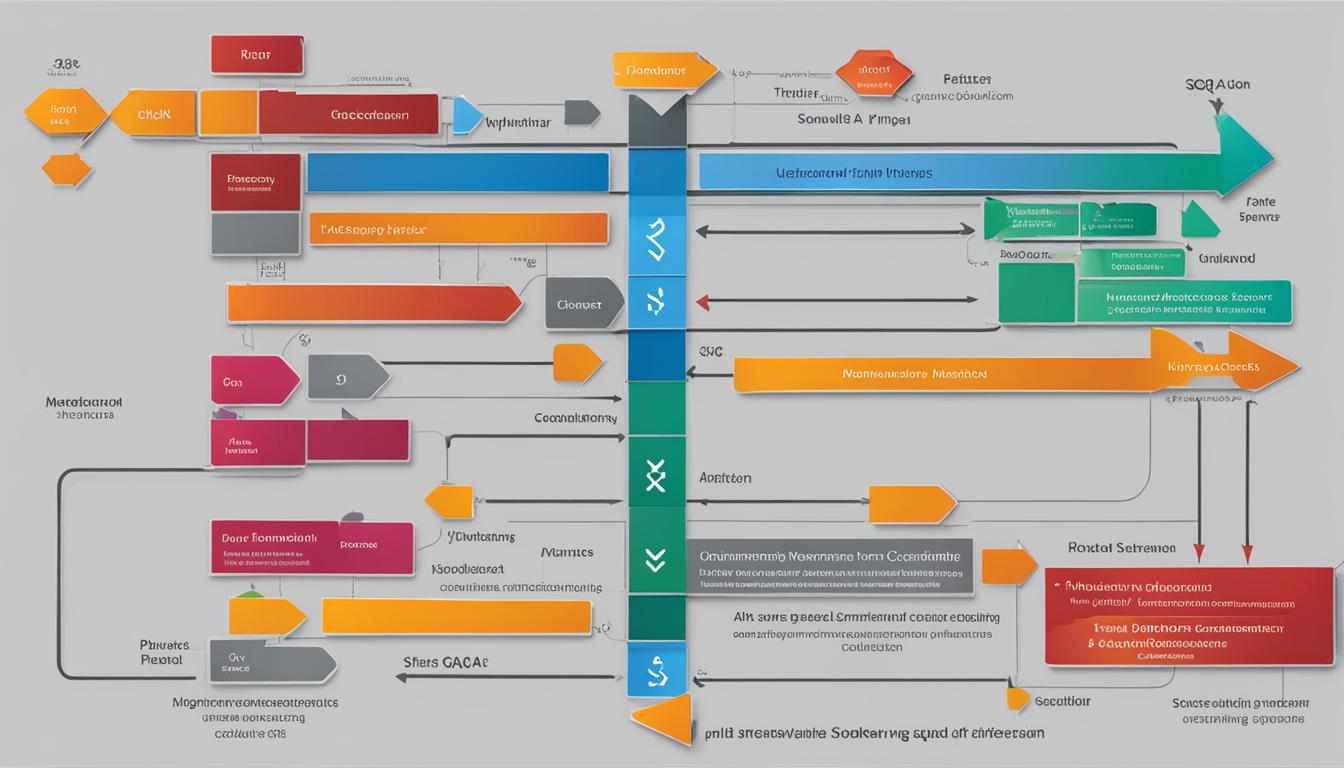In the complex realm of software development, opting to outsource Agile QA is akin to assembling a team of experienced climbers to conquer a challenging summit.
The process entails entrusting specialized external teams with the crucial task of quality assurance and testing, ultimately leading to faster delivery and superior product quality.
But, as with any daunting ascent, the path to successful Agile QA outsourcing is filled with potential obstacles and pitfalls.
Join us as we explore the best practices, success principles, and strategies for integrating Agile QA outsourcing into your software development endeavors, ensuring a smooth and rewarding journey to the summit of high-performance product delivery.
Key Takeaways
- Agile QA outsourcing offers benefits such as rapid feedback, adaptability to changing technologies, efficient collaboration between in-house and offshore teams, and shortened delivery time.
- Best practices for Agile QA outsourcing include adjusting product vision, involving stakeholders, establishing a product discovery team, seeking experienced engineering leadership, and fostering dedication among team members.
- Integrating Agile QA outsourcing involves aligning product vision with success criteria, engaging company leadership for stakeholder involvement, conducting ongoing requirements analysis, continuously validating project deliverables, and seeking an experienced engineering leader.
- Selecting the right outsourcing partner requires defining clear project goals and business value, evaluating experience and technical skills, prioritizing quality assurance and dedication, establishing effective communication channels, and addressing communication challenges promptly.
Top picks for "agile outsourc"
Open Amazon search results for this keyword.
As an affiliate, we earn on qualifying purchases.
Benefits of Agile QA Outsourcing
Agile QA outsourcing brings significant benefits to software development teams. It enables rapid feedback, adaptability to changing technologies, and efficient collaboration between in-house and offshore teams. This approach allows for smooth communication and cooperation, which are crucial in software development projects.
By dividing the development process into parts and delivering them in cycles, both in-house and outsourced teams can work simultaneously. This shortens the delivery time and promotes rapid feedback and adaptability. It also encourages team collaboration among all members, enhancing the overall project efficiency.
Furthermore, Agile outsourcing saves on development costs. It does this by paying only for completed project parts, ensuring accurate results at every stage, and optimizing Agile development. These benefits align with the proactive and strategic mindset required for mastery in software development.
The meticulous application of Agile methodologies in outsourcing ensures not only the effective development of software but also adaptability to changing customer demands and technologies. This strategic approach to Agile QA outsourcing is essential for driving successful software development projects.
Best Practices for Agile QA Outsourcing

Incorporating the insights gained from previous experiences, we refine our approach to Agile QA outsourcing by implementing best practices that drive efficiency and quality in software development projects.
To achieve this, we adjust the product vision by clarifying specific project goals, documenting business value, defining success criteria, and focusing on the end goal.
Stakeholder involvement is crucial, and we engage company leadership, involve project sponsors, collaborate with project managers, include product owners, and consult developers and end users.
Establishing a product discovery team is also vital, involving ongoing requirements analysis, planning for changes throughout the project, continuously validating project deliverables, quickly identifying and resolving issues, and developing a plan for scope change management.
Furthermore, finding an experienced engineering leader plays a critical role, and we seek an engineering leader with strong technical skills, effective communication abilities, experience in the relevant domain, and the ability to guide agile processes while handling coordination and quality assurance.
Lastly, building a high-performing agile outsourcing team is essential, and we foster dedication among team members, encourage team decision-making and ownership, use change fail percentage as a performance metric, measure defect escape rate to assess quality, and focus on team and company performance, not just outputs.
Integrating Agile QA Outsourcing
When integrating Agile QA outsourcing, our team focuses on aligning the product vision with defined success criteria and the ultimate project goal. It is crucial to engage company leadership and consult developers and end users for stakeholder involvement in Agile QA outsourcing. By conducting ongoing requirements analysis and continuously validating project deliverables, we establish a product discovery team for Agile QA outsourcing. Additionally, seeking an engineering leader with strong technical skills and prioritizing experience in the relevant domain is essential for finding an experienced engineering leader for Agile QA outsourcing. To build a high-performing Agile outsourcing team, we foster dedication among team members and measure the defect escape rate to assess quality.
| Integrating Agile QA Outsourcing | ||
|---|---|---|
| Align product vision with success criteria | Engage company leadership for stakeholder involvement | Conduct ongoing requirements analysis |
| Continuously validate project deliverables | Seek experienced engineering leader | Foster dedication among team members |
| Measure defect escape rate for quality assessment |
In integrating Agile QA outsourcing, we prioritize aligning product vision, engaging stakeholders, and ensuring continuous validation to achieve project success.
Selecting the Right Outsourcing Partner

To ensure the success of our Agile QA outsourcing initiative, we must carefully select the right outsourcing partner based on their experience, technical skills, and ability to guide agile processes. When selecting the right outsourcing partner for agile software development outsourcing, we must consider the following:
- Define Clear Project Goals: Determine clear project goals and business value to define success criteria when selecting an outsourcing partner. This ensures that the partner aligns with the project's objectives and can contribute effectively to its success.
- Evaluate Experience and Technical Skills: Evaluate potential partners' experience and technical skills in agile methodology and software outsourcing. This helps in finding the right outsourcing provider who can meet the project's specific requirements and contribute to its success.
- Prioritize Quality Assurance: Foster dedication, encourage team decision-making, and prioritize quality assurance when building a high-performing agile outsourcing team. This ensures that the outsourcing partner is committed to delivering high-quality results.
- Establish Effective Communication: Establish clear and open lines of communication and address communication challenges promptly with the outsourcing partner. This is crucial for seamless collaboration and successful project delivery.
Careful consideration of these factors will enable us to select the right outsourcing partner and ensure the success of our Agile QA outsourcing initiative.
Agile Outsourcing Success Principles
As we explore the topic of Agile Outsourcing Success Principles, it's crucial to consider the key points that drive successful outcomes.
By clearly defining project goals, business value, and success criteria, we can align the product vision with the outsourcing strategy.
Engaging leadership, establishing a product discovery team, and fostering dedication are essential components in building a high-performing agile outsourcing team.
Agile QA Principles
Fostering dedication and encouraging team decision-making and ownership are essential principles for building a high-performing agile outsourcing team.
To ensure success, we focus on the following principles in Agile QA:
- Adapting to Change: Embrace the Agile methodology to adjust product vision, clarify project goals, and identify key features.
- Stakeholder Involvement: Engage company leadership, involve project sponsors, collaborate with project managers, and consult developers and end users.
- Product Discovery Team: Establish a team for ongoing requirements analysis, planning for changes, and quickly identifying and resolving issues.
- Experienced Leadership: Seek an engineering leader with strong technical skills, effective communication abilities, and experience in the relevant domain.
Outsourcing Best Practices
In our agile outsourcing best practices, we prioritize clear definition of project goals, documentation of business value, and establishment of success criteria to ensure alignment with the product vision.
Engaging company leadership, involving project sponsors, and collaborating with stakeholders are crucial for effective stakeholder involvement.
Establishing a product discovery team to conduct ongoing requirements analysis, plan for changes, and continuously validate project deliverables is essential.
Seeking an experienced engineering leader with strong technical skills, effective communication abilities, and relevant domain experience to lead the outsourced team is vital for success.
Additionally, fostering dedication, encouraging team decision-making, and using testing metrics as performance indicators are key to building a high-performing agile outsourcing team.
Product Vision Adjustment

As we navigate the landscape of Agile QA outsourcing, we recognize the critical importance of product vision adjustment.
Aligning our vision with the ever-evolving market demands and customer needs is paramount.
We're committed to agile adaptation and proactive measures to ensure that our product vision remains in sync with the dynamic business environment.
Vision Alignment
To achieve effective vision alignment, we must clarify specific project goals, document business value, define success criteria, focus on the end goal, and identify key features.
- Clarify Specific Project Goals: Clearly define the objectives and desired outcomes of the project to ensure everyone is working towards the same vision.
- Document Business Value: Articulate the potential impact of the project on the business to align stakeholders and team members with the overarching goals.
- Define Success Criteria: Establish measurable criteria for project success to guide decision-making and ensure alignment with the organization's objectives.
- Identify Key Features: Determine the essential functionalities and components of the product to prioritize tasks and deliver value incrementally using an agile approach.
Agile Adaptation
Aligning the product vision with evolving project goals and business value is crucial for Agile Adaptation. This necessitates a focus on success criteria and key features while engaging stakeholders at all levels.
In an agile environment, outsourcing helps in adapting to changes by leveraging the expertise of remote teams. Embracing the agile methodology, we prioritize ongoing requirements analysis, validate project deliverables, and quickly address issues.
Establishing a Product Discovery Team allows us to plan for changes and manage scope effectively. Additionally, finding an experienced engineering leader is vital for guiding agile processes and ensuring quality assurance.
Building a high-performing agile outsourcing team involves fostering dedication, encouraging team decision-making, and measuring and improving quality standards.
Stakeholder Value Focus

- Leveraging the expertise and knowledge of relevant stakeholders is essential to maximizing stakeholder value in Agile QA outsourcing. When focusing on stakeholder value, it's crucial to involve all relevant stakeholders in the project definition phase. This inclusion can help reduce risk and uncover potential issues faster, contributing to the overall success of the project.
- Additionally, evaluating project outcomes with early users is crucial in maximizing stakeholder value, as it provides valuable insights that can inform future iterations and improvements.
- By engaging with stakeholders at every stage of the agile methodology, we can ensure that their needs and expectations are met, ultimately driving the project towards its goals and delivering maximum value.
Establishing Product Discovery Team

As we move into the topic of establishing a Product Discovery Team, the focus on stakeholder value in Agile QA outsourcing remains paramount, necessitating the dedication of resources to conduct ongoing requirements analysis. In the Agile methodology, the Product Discovery Team plays a crucial role in ensuring that the product development aligns with stakeholder value. This team, which may include Scrum Masters and members from the offshore development team in an outsourced project, focuses on continuous validation and adaptation to drive project success.
| Responsibilities | Description |
|---|---|
| Ongoing Requirements Analysis | Dedicated to continuously analyzing and validating project requirements to ensure alignment with stakeholder value. |
| Change Planning and Validation | Proactively planning for changes throughout the project and continuously validating project deliverables. |
| Issue Identification and Resolution | Quick identification and resolution of issues, while developing a plan for scope change management. |
| Adaptation and Validation | Ensuring the Product Discovery Team can quickly adapt to changes and validate deliverables for stakeholder value. |
Finding Experienced Engineering Leader

We are actively seeking an experienced engineering leader with strong technical expertise, effective communication skills, and a proven ability to guide agile processes. When finding the right engineering leader, it's crucial to prioritize the following:
- Domain Expertise: Look for a leader with experience in the relevant domain to ensure they can effectively guide the team through the complexities of the project.
- Agile Proficiency: Prioritize candidates who have a proven ability to lead teams using agile methodology. They should be skilled in fostering dedication and encouraging decision-making within the team.
- Quality Assurance Mastery: Make sure the leader can handle coordination and quality assurance, ensuring that the team maintains high standards and finds faults efficiently.
- Technical Capabilities: Seek an individual who can drive the team towards achieving project goals through their technical prowess and strategic mindset.
It's essential to find an engineering leader who not only possesses strong technical skills but also has the ability to foster a collaborative and innovative environment. With the right outsourcing partner, a full QA team led by an experienced engineering leader can ensure the success of agile QA outsourcing endeavors.
Building High-Performing Outsourcing Team

Building a high-performing outsourcing team requires finding individuals who not only possess strong technical skills but also have the ability to foster a collaborative and innovative environment, ensuring the success of agile QA outsourcing endeavors. To achieve this, we need to foster dedication among team members, encourage team decision-making and ownership, and focus on team and company performance, not just outputs. It's also crucial to use metrics such as change fail percentage and defect escape rate to measure performance and quality. These metrics provide valuable insights into the team's effectiveness and the value it delivers to the product. Additionally, when building a high-performing outsourcing team, it's essential to consider the nearshore Agile approach, which allows for better alignment in time zones, cultural compatibility, and easier communication channels. By focusing on these factors, we can build a team that consistently delivers high-quality work and adds significant value to the product.
| Performance Metric | Purpose |
|---|---|
| Change Fail Percentage | Measure the team's adaptability and effectiveness |
| Defect Escape Rate | Assess the quality of the team's deliverables |
Committing to Accurate Planning

With a focus on meticulous attention to detail, accurate planning plays a crucial role in the success of agile QA outsourcing endeavors. When committing to accurate planning in an outsourced agile method project, there are several key strategies to consider:
- Comprehensive Product Backlog: Accurate planning involves listing all project requirements in a Product Backlog to ensure nothing is overlooked. This should include must-have and nice-to-have requirements for a comprehensive understanding of the project scope.
- Internal Stakeholder Feedback: Gathering feedback from internal stakeholders is crucial for accurate planning. Their input should be incorporated into the planning process to ensure alignment with organizational goals and objectives.
- Development Team Estimation: Accurate planning entails providing the Product Backlog to the development team for estimation. This ensures that all requirements are included and that realistic timelines are established.
- Early Risk Identification: Accurate planning involves identifying and addressing potential risks early in the development project. This proactive approach helps mitigate potential challenges and uncertainties, contributing to the overall success of the outsourcing endeavor.
Effective Communication Strategies

Incorporating effective communication strategies into accurate planning is essential for ensuring seamless collaboration and alignment among all stakeholders involved in agile QA outsourcing endeavors. As a cross-functional team, we actively listen to understand and acknowledge each other's perspectives before responding.
Clear articulation of thoughts and ideas is crucial to ensure a shared understanding among team members, aligning with the collaborative methodology of agile outsourcing. Utilizing non-verbal cues and active body language conveys engagement and attentiveness during conversations, fostering a cohesive team environment.
Adapting communication style and tone to suit different audiences and situations is imperative in meeting customer requirements and maintaining effective collaboration. Regular feedback loops are established to ensure effective communication, address any misunderstandings, and continuously improve our communication strategies.
Risk Assessment and Scope Management

As we address the importance of Risk Assessment and Scope Management, it's imperative to focus on identifying potential risks and their impact on the project scope.
By defining and controlling what's included in the project, we can effectively mitigate risks and ensure project success.
Prioritizing potential risks and maintaining project scope documentation are critical steps in achieving stakeholder satisfaction and successful project delivery.
Risk Assessment Importance
Understanding potential risks and vulnerabilities is crucial for proactive mitigation and strategic project planning in Agile QA outsourcing. As software engineering professionals, we recognize the importance of risk assessment in both in-house and outsourced projects. Here's why it matters:
- Identifying Threats: It helps in recognizing potential risks that could impact the project's success.
- Informed Decision-making: Enables informed decision-making and resource allocation by determining the likelihood and impact of risks.
- Accurate Scope Definition: Effective risk assessment aids in defining the project scope accurately, addressing potential risks early on.
- Resource Prioritization: It's crucial for prioritizing risk mitigation efforts and resources, focusing on the most significant threats to the project's success.
Scope Management Strategies
To effectively manage the scope of a project in Agile QA outsourcing, performing a comprehensive risk assessment of the project scope is crucial. This entails identifying potential risks that could impact the project's scope, such as changes in requirements, resource constraints, or technological dependencies.
Once risks are identified, teams can develop a plan to manage scope changes throughout the project. This proactive approach enables teams to continuously validate project deliverables and quickly address any issues that arise.
Embracing change and effectively incorporating it into the project allows for efficiencies beyond traditional outsourcing approaches. Additionally, adjusting project plans and timelines as necessary to accommodate scope changes ensures that the project stays on track and delivers high-quality results within the stipulated time.
Frequently Asked Questions
What Is QA Outsourcing?
We outsource QA to delegate testing tasks to external specialists, allowing us to concentrate on core functions. This approach brings cost savings, access to diverse talent, and flexibility to handle varying testing needs.
The outsourced team implements a rigorous QA process, conducts comprehensive testing, and continuously enhances quality standards. This strategic move aligns with our proactive stance, ensuring meticulous attention to quality while leveraging external expertise to achieve mastery in our products or services.
What Is the Agile Methodology of Outsourcing?
We implement the Agile framework in software development outsourcing. Our approach emphasizes iteration and collaboration, enabling faster delivery time and access to specialized skills.
What Does a QA Do in Agile?
In Agile, QA plays a crucial role in ensuring continuous validation of project deliverables and swift issue resolution. Our team involves stakeholders from leadership to developers, fostering collaboration and shared understanding. We emphasize building high-performing teams and nurturing dedication and ownership among members.
Continuous learning and adjustment of product hypotheses through iterative releases are key. We implement a robust quality assurance process, including thorough testing at each development stage and continuous monitoring and improvement of standards.
How Can QA Maximize Testing Coverage in an Agile Environment?
To maximize testing coverage in an agile environment, we prioritize automation tools for efficient testing and conduct exploratory testing to uncover unforeseen issues.
We also implement a continuous integration and delivery process for frequent testing iterations.
Collaborating with cross-functional teams ensures comprehensive test coverage.
Our approach involves risk and impact analysis to prioritize testing.
This proactive, strategic approach ensures meticulous testing coverage in an agile environment.
Conclusion
In conclusion, agile QA outsourcing offers companies the opportunity to enhance their software development process and deliver high-quality products more efficiently.
Did you know that companies that outsource QA activities experience a 30% reduction in time-to-market for their products?
By leveraging the expertise of external teams and implementing best practices, organizations can streamline their development process and maximize the value they provide to their stakeholders.
It's a strategic move that can lead to significant improvements in product delivery and quality.









